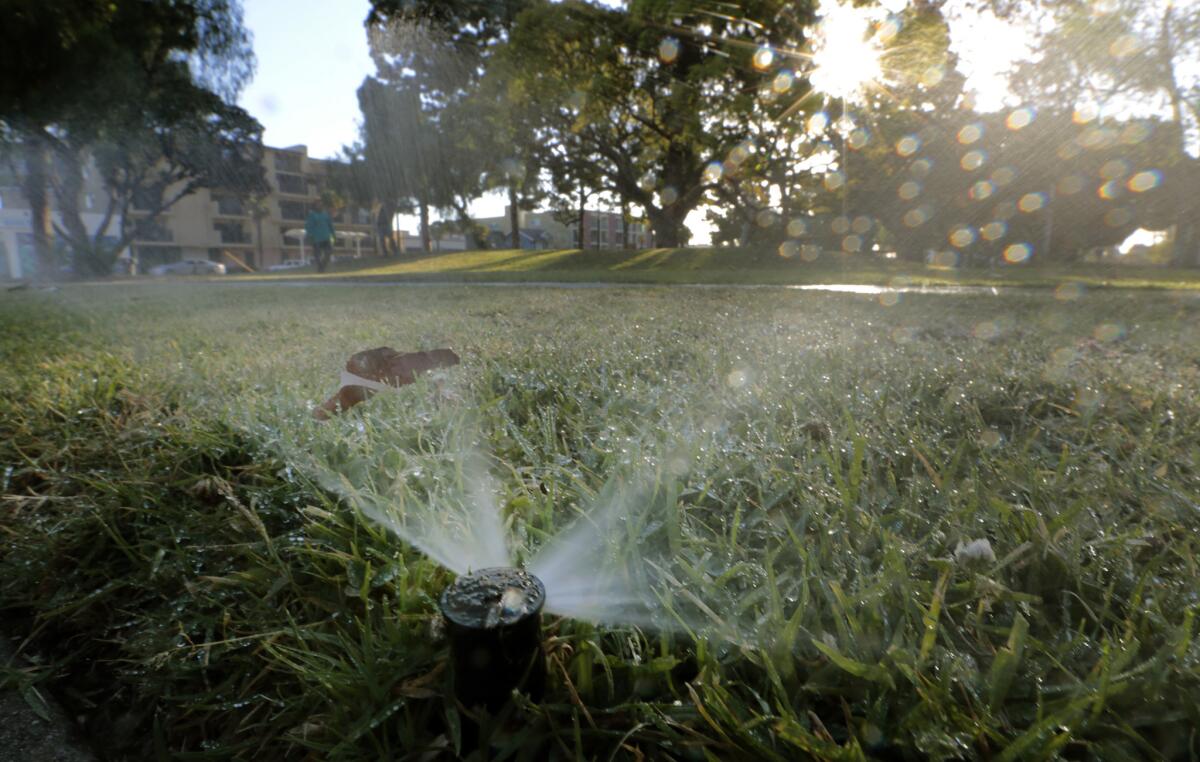Amid heated criticism, California water board to release draft cuts

- Share via
The state Water Resources Control Board is scheduled to release its draft emergency water conservation regulations Saturday morning, in a historic bid to slash California’s urban water use by 25%.
Water board officials had planned to release the documents early Friday evening, but a spokesperson now says they won’t be made public until Saturday morning.
The regulations, which are scheduled for formal adoption in early May, are likely to anger urban water suppliers, who face fines of up to $10,000 a day for failing to meet the cuts. This week, water suppliers blasted a framework proposal, saying the cuts were too steep and unfairly affected a variety of water users.
Water board officials said they took complaints into consideration when drafting Friday’s regulations, but their mandate is clear.
On April 1, Gov. Jerry Brown issued an executive order that demanded a 25% reduction in urban potable water usage, and said that severe drought conditions were steadily depleting the state’s water supplies, and that the situation could continue into 2016 and beyond.
Friday’s draft release will open a short period of informal public comment. An emergency rule-making formal notice has been scheduled for April 28, and a formal hearing and adoption will probably take place on May 5 or 6, according to the water board.
Officials estimate that the restrictions would save roughly 1.3 million acre-feet of water over the next nine months. A single acre-foot of water is enough to supply two households for a year.
This week, the water board received more than 200 letters from water suppliers and others saying that the proposed restrictions would increase wildfire risk and unfairly punish communities that have already been working to conserve water, among other grievances.
The regulations target more than 400 local water agencies, who will be responsible for implementing reductions in water use by anywhere from 10% to 35%. The board has proposed fines of up to $10,000 a day for agencies that fail to implement the cuts.
The steepest cuts would hit cities with the highest rates of per-capita water consumption during September of last year. They include small rural communities, along with affluent cities such as Newport Beach and Beverly Hills. Cities with the lowest per-capita use that month, including Santa Cruz and Seal Beach, would have to cut the least.
Some of the communities likely to have the biggest cuts use roughly 300 gallons of water per resident per day, according to Thomas Howard, the water board’s executive director. Reducing that to about 200 gallons per day is “attainable,” he said.
The governor agrees. On Thursday, Brown defended the cuts after meeting with business leaders in Sacramento.
“From everything I can see here, it’s attainable,” Brown said. “Maybe we can do more. Maybe we have to do it differently. We don’t do it all in one day.”
Some water suppliers disagree.
The proposal “treats agencies with a history of saving water the same as others that are only now beginning to meter water used by their consumers,” wrote Jeffrey Kightlinger, general manager of the Metropolitan Water District of Southern California.
Kimberly Thorner, general manager of the Olivenhain Municipal Water District in northern San Diego County, wrote that the proposed regulations “punish those who have conserved and reward communities that did not make such early and sustained commitment to conservation.”
Southern California farmers who get supplies from urban water districts say their businesses would be devastated. “We cannot just turn off water at 20-35% and expect the trees and bushes to thrive,” wrote Neil Nagata of Nagata Brothers Farms in San Luis Rey near Oceanside. “If I do not produce a crop, I will not have any income to continue farming at all.”
Twitter: @bymattstevens, @chrismegerian and @montemorin
More to Read
Sign up for Essential California
The most important California stories and recommendations in your inbox every morning.
You may occasionally receive promotional content from the Los Angeles Times.
















